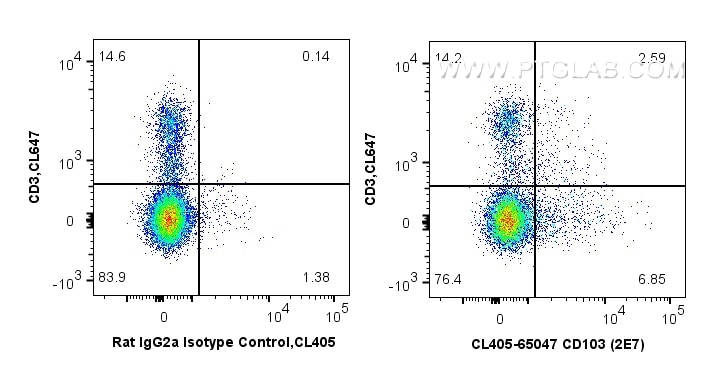Tested Applications
| Positive FC detected in | mouse splenocytes |
Recommended dilution
| Application | Dilution |
|---|---|
| Flow Cytometry (FC) | FC : 1 ug per 10^6 cells in 100 μl suspension |
| This reagent has been tested for flow cytometric analysis. It is recommended that this reagent should be titrated in each testing system to obtain optimal results. | |
| Sample-dependent, Check data in validation data gallery. | |
Product Information
CL405-65047 targets CD103 in FC applications and shows reactivity with mouse samples.
| Tested Reactivity | mouse |
| Host / Isotype | Armenian Hamster / IgG |
| Class | Monoclonal |
| Type | Antibody |
| Immunogen |
C57BL/6J mouse intestinal intraepithelial lymphocytes (IEL) Predict reactive species |
| Full Name | integrin alpha E, epithelial-associated |
| GenBank Accession Number | BC150690 |
| Gene Symbol | CD103 |
| Gene ID (NCBI) | 16407 |
| RRID | AB_3083818 |
| Conjugate | CoraLite® Plus 405 Fluorescent Dye |
| Excitation/Emission Maxima Wavelengths | 399 nm / 422 nm |
| Form | Liquid |
| Purification Method | Affinity purification |
| UNIPROT ID | Q60677 |
| Storage Buffer | PBS with 0.09% sodium azide, pH 7.3. |
| Storage Conditions | Store at 2-8°C. Avoid exposure to light. Stable for one year after shipment. |
Background Information
CD103, also known as integrin alpha-E (ITGAE) or integrin alpha-IEL, is a type I transmembrane integrin protein that binds integrin beta 7 to form Integrin alpha-E beta-7 which is a receptor for E-cadherin and mediates adhesion of T lymphocytes to epithelial cells (PMID: 7969453; 8468482). CD103 is expressed on intraepithelial lymphocyte (IEL) T cells (both alpha/beta T cells and gamma/delta T cells), some peripheral regulatory T cells (Tregs), lamina propria T cells, and a subset of dendritic cells in the gut mucosa and mesenteric lymph nodes (PMID: 12242333; 15608520; 16216890).
Protocols
| Product Specific Protocols | |
|---|---|
| FC protocol for CL Plus 405 CD103 antibody CL405-65047 | Download protocol |
| Standard Protocols | |
|---|---|
| Click here to view our Standard Protocols |




